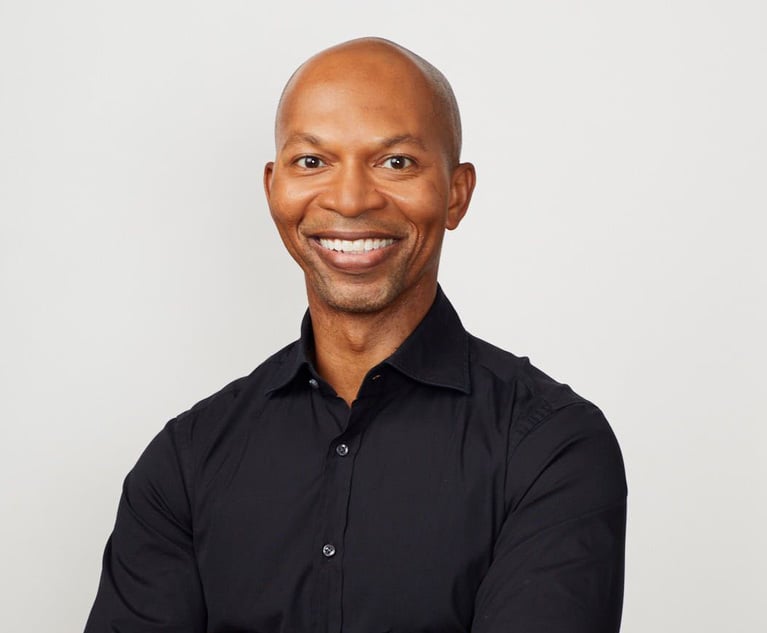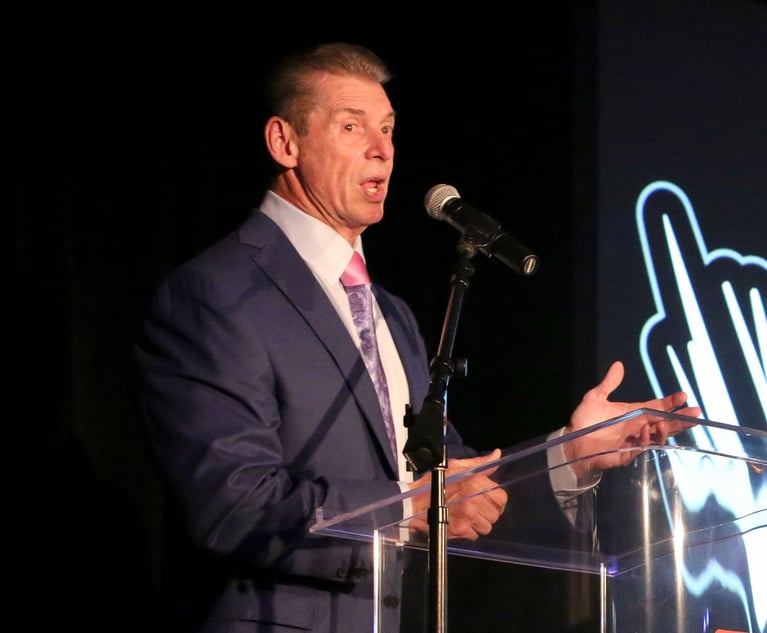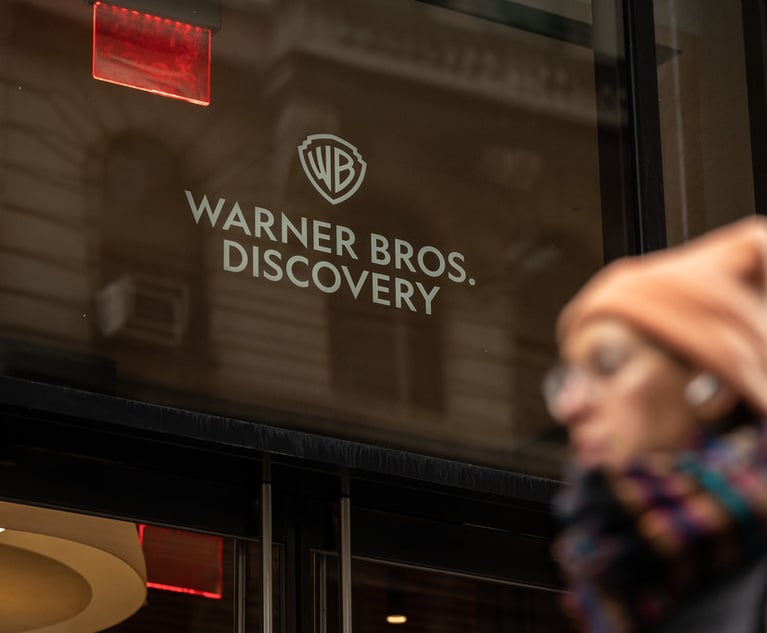 Jerry Seinfeld attends the "Comedians in Cars Getting Coffee" photo call at The Paley Center on July 17, 2019. (Photo by Willy Sanjuan/Invision/AP)
Jerry Seinfeld attends the "Comedians in Cars Getting Coffee" photo call at The Paley Center on July 17, 2019. (Photo by Willy Sanjuan/Invision/AP)2nd Circuit Upholds Dismissal of Copyright Suit Against Jerry Seinfeld Over 'Comedians in Cars' Series
When the "Comedians in Cars" pilot aired in July 2012 without crediting Charles, it was also apparent that Charles' claim to ownership had been "publicly repudiated," officially putting him on notice of his claims, the Second Circuit said.
May 07, 2020 at 02:48 PM
4 minute read
A Second Circuit panel has upheld the dismissal of a copyright lawsuit from a former collaborator of Jerry Seinfeld, who claimed to have come up with the idea for the hit series "Comedians in Cars Getting Coffee."
The U.S. Court of Appeals for the Second Circuit ruled in a summary order Thursday that Christian Charles, a writer and director who worked with Seinfeld on the show's pilot, had waited too long to file his suit under the three-year statute of limitations for copyright infringement claims.
The ruling upheld an earlier ruling by U.S. District Judge Alison Nathan of the Southern District of New York, who tossed the 2018 lawsuit last October on substantially the same grounds.
Seinfeld's lawyer, who in the past has bashed Charles' suit as a self-serving "money grab," said in a statement Thursday that the Second Circuit's ruling was further proof that his client was the "sole creator" of the show.
"At every level, the courts have seen through this ridiculous attempt to capitalize on the success of the show," said Orin Snyder, a partner in the New York office in Gibson, Dunn & Crutcher. "Today's ruling by the appellate court is another vindication against these opportunistic and phony claims."
Peter Skolnik, of Clark Guldin, the New Jersey and New York-based lawyer who represented Charles, did not immediately respond to a request for comment.
The Second Circuit panel held that Charles' claims hinged on whether his contributions to the show's pilot had qualified him as the owner of the "Comedians in Cars" copyrights. But the ruling credited Nathan's findings that Seinfeld had twice rejected Charles' requests for back-end compensation before "Comedians in Cars" premiered in 2012, making it clear that Seinfeld considered Charles' only involvement to be on a work-for-hire basis.
When the "Comedians in Cars" pilot aired in July 2012 without crediting Charles, it was also apparent that Charles' claim to ownership had been "publicly repudiated," officially putting him on notice of his claims, the Second Circuit said.
"Either one of these developments was enough to place Charles on notice that his ownership claim was disputed and therefore this action, filed six years later, was brought too late," the panel wrote in a three-page order.
"Charles's infringement claim is therefore time-barred because his ownership claim is time-barred," the decision said.
According to court documents, Charles worked up a treatment and shot a pilot with Seinfeld when the comedian began developing the show as a web series in 2012. The two later had a falling out over Charles' demands for compensation and ownership, and while he was ultimately paid nearly $108,00 for his work, Charles had no further involvement with "Comedians in Cars."
Charles said in court filings that between 2012 and 2014 that he "maintained a reasonable and good faith belief" that Seinfeld would eventually acknowledge his ownership and "bring him in" on the show, which originally debuted on the streaming service Crackle.
In wasn't until Netflix inked a lucrative deal to bring the show onto its platform in 2017 that Seinfeld's lawyer told Charles directly that his client was the sole creator and owner of the show, he said.
Nathan's ruling last year, however, rejected those arguments and dismissed the case under the statute of limitations, finding that a "reasonably diligent plaintiff would have understood that Seinfeld was repudiating any claim of ownership that Charles may have."
"We conclude that the district court was correct in granting defendants' motion to dismiss, for substantially the same reasons that it set out in its well-reasoned opinion," the Second Circuit said Thursday.
The panel included Second Circuit Judges John M. Walker Jr., Rosemary S. Pooler and Gerard E. Lynch.
Read More:
This content has been archived. It is available through our partners, LexisNexis® and Bloomberg Law.
To view this content, please continue to their sites.
Not a Lexis Subscriber?
Subscribe Now
Not a Bloomberg Law Subscriber?
Subscribe Now
NOT FOR REPRINT
© 2024 ALM Global, LLC, All Rights Reserved. Request academic re-use from www.copyright.com. All other uses, submit a request to [email protected]. For more information visit Asset & Logo Licensing.
You Might Like
View All
SoundCloud GC Takes Legal Reins of Condé Nast at Tumultuous Time

With SDNY Stay Lifted, Sex Trafficking Civil Suit Against Vince McMahon, WWE Gets Green Light
3 minute read
Big Tech and Internet Companies Slammed With Consumer Class Actions in December

Law Firms Mentioned
Trending Stories
- 1Decision of the Day: Administrative Court Finds Prevailing Wage Law Applies to Workers Who Cleaned NYC Subways During Pandemic
- 2Trailblazing Broward Judge Retires; Legacy Includes Bush v. Gore
- 3Federal Judge Named in Lawsuit Over Underage Drinking Party at His California Home
- 4'Almost an Arms Race': California Law Firms Scooped Up Lateral Talent by the Handful in 2024
- 5Pittsburgh Judge Rules Loan Company's Online Arbitration Agreement Unenforceable
Who Got The Work
Michael G. Bongiorno, Andrew Scott Dulberg and Elizabeth E. Driscoll from Wilmer Cutler Pickering Hale and Dorr have stepped in to represent Symbotic Inc., an A.I.-enabled technology platform that focuses on increasing supply chain efficiency, and other defendants in a pending shareholder derivative lawsuit. The case, filed Oct. 2 in Massachusetts District Court by the Brown Law Firm on behalf of Stephen Austen, accuses certain officers and directors of misleading investors in regard to Symbotic's potential for margin growth by failing to disclose that the company was not equipped to timely deploy its systems or manage expenses through project delays. The case, assigned to U.S. District Judge Nathaniel M. Gorton, is 1:24-cv-12522, Austen v. Cohen et al.
Who Got The Work
Edmund Polubinski and Marie Killmond of Davis Polk & Wardwell have entered appearances for data platform software development company MongoDB and other defendants in a pending shareholder derivative lawsuit. The action, filed Oct. 7 in New York Southern District Court by the Brown Law Firm, accuses the company's directors and/or officers of falsely expressing confidence in the company’s restructuring of its sales incentive plan and downplaying the severity of decreases in its upfront commitments. The case is 1:24-cv-07594, Roy v. Ittycheria et al.
Who Got The Work
Amy O. Bruchs and Kurt F. Ellison of Michael Best & Friedrich have entered appearances for Epic Systems Corp. in a pending employment discrimination lawsuit. The suit was filed Sept. 7 in Wisconsin Western District Court by Levine Eisberner LLC and Siri & Glimstad on behalf of a project manager who claims that he was wrongfully terminated after applying for a religious exemption to the defendant's COVID-19 vaccine mandate. The case, assigned to U.S. Magistrate Judge Anita Marie Boor, is 3:24-cv-00630, Secker, Nathan v. Epic Systems Corporation.
Who Got The Work
David X. Sullivan, Thomas J. Finn and Gregory A. Hall from McCarter & English have entered appearances for Sunrun Installation Services in a pending civil rights lawsuit. The complaint was filed Sept. 4 in Connecticut District Court by attorney Robert M. Berke on behalf of former employee George Edward Steins, who was arrested and charged with employing an unregistered home improvement salesperson. The complaint alleges that had Sunrun informed the Connecticut Department of Consumer Protection that the plaintiff's employment had ended in 2017 and that he no longer held Sunrun's home improvement contractor license, he would not have been hit with charges, which were dismissed in May 2024. The case, assigned to U.S. District Judge Jeffrey A. Meyer, is 3:24-cv-01423, Steins v. Sunrun, Inc. et al.
Who Got The Work
Greenberg Traurig shareholder Joshua L. Raskin has entered an appearance for boohoo.com UK Ltd. in a pending patent infringement lawsuit. The suit, filed Sept. 3 in Texas Eastern District Court by Rozier Hardt McDonough on behalf of Alto Dynamics, asserts five patents related to an online shopping platform. The case, assigned to U.S. District Judge Rodney Gilstrap, is 2:24-cv-00719, Alto Dynamics, LLC v. boohoo.com UK Limited.
Featured Firms
Law Offices of Gary Martin Hays & Associates, P.C.
(470) 294-1674
Law Offices of Mark E. Salomone
(857) 444-6468
Smith & Hassler
(713) 739-1250






